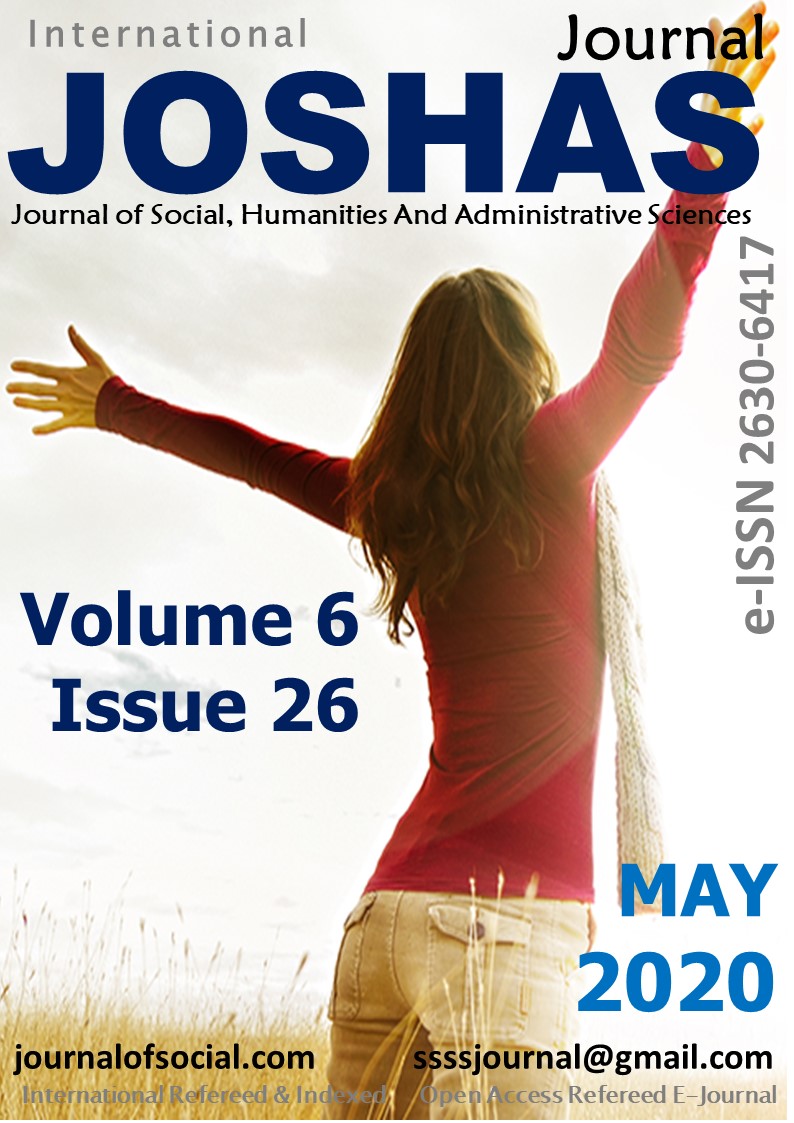Author :
Abstract
Geleneksel ekonomik sermaye kavramı gelir ve maddi değerleri içerir ve neye sahipsin sorusuna yanıt arar. Sermayenin değişim sürecinde neyi biliyorsun sorusu ise beşerî sermayeyi (tecrübe, eğitim, yetenek, bilgi, fikir vs.) tanımlar. Beşerî sermaye emeğin işletme performansına katkısını ifade eder. Sosyal sermaye beşerî sermayenin tamamlayıcısıdır ve kimi tanıyorsun sloganı içerisinde ilişkiler, bağlantılar, arkadaşlıklar, dostluklar, aile bağları gibi temaları barındırır. Ayrıca sosyal sermaye, beşerî sermayenin işletmelerde verimliliğin arttırılması boyutunun ötesine geçerek bir toplumun kalkınmışlık seviyesine etki edebilecek bir yöne işaret etmektedir. Sosyal sermaye gelişmiş ülkelerin gizli kaynaklarından biridir. Yerel ekonomik kalkınma açısından sosyal sermaye, kalkınma sürecini hızlandırmak için aktörler arasında kurulan ağları ve iş birliğini ifade etmektedir. Bir toplumun sosyal sermayesi; bilgi edinme, üretme, paylaşma, koordine olabilme, ilişkilerin gücünü sosyoekonomik hayata aktarabilmesidir. Sosyal sermaye yerel ekonomilerin parasal gücü kadar önemli bir gücü ifade eder. Bu bağlamda çalışmanın amacı, yerel ekonomik kalkınmada sosyal sermayenin rolünü ortaya koymaktır. Yerel de sosyal sermaye kalkınma sürecinde aktif olarak kullanıldığında, yoksulluğu önleme(özellikle dezavantajlı (kadınlar) grupların ekonomiye katılımı, yolsuzlukla mücadele, daha rekabetçi firmalar, yenilik (inovasyon)yapabilme, üretimde verimlilik, çevreye duyarlılık gibi sayısız pozitif katkıyı içermektedir.
Keywords
Abstract
The concept of traditional economic capital includes income and material values and seeks an answer to the question of what you have. The question of what do you know in the process of change of capital defines human capital (experience, education, ability, knowledge, idea, etc.). Human capital refers to the contribution of labor to operating performance. Social capital is a complement to human capital and includes slogans such as relationships, connections, friendships, friendships, family ties within the slogan of whom you know. In addition, social capital goes beyond the dimension of human capital to increase productivity in enterprises, pointing to a direction that can affect the development level of a society. Social capital is one of the secret sources of developed countries. In terms of local economic development, social capital refers to the networks and cooperation established between the actors to speed up the development process. The elements of obtaining, producing, sharing, coordinating and transferring the power of relations to socioeconomic life constitute the social capital of a society. Social capital represents an important power as much as the monetary power of local economies. In this context, the aim of the study is to reveal the role of social capital in local economic development. When used actively in the process of social capital development locally, it includes numerous positive contributions such as poverty prevention (especially participation of disadvantaged (women) groups in the economy, fighting corruption, more competitive firms, innovation (innovation), production efficiency, environmental awareness.
Keywords
- Alacahan, O. ve Duman, B.(2011), Güven ve Sivil Bağlılık Boyutuyla Sosyal Sermaye ve Mezhep:
- Alacahan, O. ve Duman, B.(2011), Güven ve Sivil Bağlılık Boyutuyla Sosyal Sermaye ve Mezhep: Kahramanmaraş Örneği, Cilt:10, Sayı:36, ss.108-131.
- Altan, R. (2007). Sosyal Sermaye ve Kalkınma. Türk İdare Dergisi, 455, 223-229.
- Ardahan, F. (2014), Bireylerin Sosyal Sermaye Profili: Antalya Örneği, Akademik Sosyal Araştırmalar Dergisi, Yıl:2, Sayı:8, ss.38-56.
- Aşkın, E.Ö, Barış, S, (2016), Kadın İstihdamında Sosyal Sermayenin Etkisi: Tokat İlinde KadınGirişimciler Üzerine Bir İnceleme, Business and Economics Research Journal, Vol:7, Number:2, ss.63-82.
- Coleman, J.S.(1990), Foundation of Social Theory, Cambridge: Harvord University press.
- Çalışkan, Ş. ve Pehlivanoğlu, F. ve Meçik, O. (2014), Bireysel Kazançların Belirlenmesinde SosyalSermayenin Rolü Yalova Örneği, C.Ü. İktisadi ve İdari Bilimler Dergisi, Cilt.15, Sayı:1, ss.313-323.Erbaşı, A. (2015), “İlçeler Düzeyinde Sosyal Sermaye Analizi: Konya ve Karaman Örneği”, Sosyoekonomi, Vol. 23(25), 47-78.
- Field, John (2008), Sosyal Sermaye, Çeviri: Bahar Bilgen ve Bayram Şen, İstanbul Bilgi Üniversitesi Yayınları, 2.Baskı, İstanbul.
- Fukuyama F. (2005). Güven, Sosyal Erdemler ve Refahın Artırılması. (Ahmet Buğdaycı çev.). İş Bankası Yayınları.
- Fukuyama, F. (2001), Social Capital, Civil Society and Development, Third World Quarterly 22: 7- 20.
- İzben, Ü. Ve Özbay, Z. (2016), Bölgesel Kalkınmada Sosyal Sermayenin Önemi: Gaziantep Örneği, 16. Bölge Bilimi ve Bölge Planlama Kongresi.
- John, H. ve Robert, P. (1995), Economic Growth and Social Capital in İtaly, Eastern Eonomic Journal, Vol.21, No:3, ss295-307.
- Karataş İ. ve Seki İ. (2017). Sosyal Sermaye ve Bölgesel Kalkınma İlişkisi: Aksaray Örneği, Ege Akademik Bakış, Cilt:17, Sayı:1, ss.105-126.
- Keskin, M. (2008). Sosyal Sermaye ve Bölgesel Kalkınma: Erzurum Ticaret ve Sanayi Odası Üyelerinde Sosyal Sermaye Düzeyi ve Belirleyicilerin Analizi, Yüksek Lisans Tezi.
- Putnam, R. (1993), Making Democracy Work: Civic Traditions in Modern Italy, Princenton University Press.
- Sertkaya, B. ve Özcan, G. (2017). Sosyal Sermayenin Ekonomik Gelişme Açısından Önemi: Gelişmişve Gelişmekte Olan Ülkeler Üzerine Bir Değerlendirme, Bulletin of Economic Theory and Analysis, 2(1), 1-12.
- Şan, M.K. ve Şimşek, R. (2011). Sosyal Sermaye Kavramının Tarihsel ve Sosyolojik Arka Planı, Akademik İncelemeler Dergisi, cilt:6, sayı:1 ss. 88-110.
- Şavkar, E. (2011). Sosyal Sermayenin Unsurları ve Ekonomik Kalkınmayla İlişkisi, Yüksek Lisans Tezi.
- Üçler, Y. ve Koraş, M. ve Güçlü, Y. (2016), Bölgesel Kalkınmada Sosyal Sermayenin Rolü: Konya Bedesten Örneği, Selçuk Üniversitesi Sosyal Bilimler Enstitüsü Dergisi, 35, ss.285-299.
- Yağmur, A. (2017). Sosyal Sermayenin Bölgesel Kalkınmaya Etkisi, Selçuk üniversitesi Sosyal ve Teknik Araştırmalar Dergisi, Sayı:13 ss.111-124.
- Yetim, N. (2002), Sosyal Sermaye Olarak Kadın Girişimciler: Mersin Örneği, Ege Akademik Bakış Dergisi, Cilt:2, Sayı:2, ss.79-92.
- Yüksel, K. (2013). İktisadi Kalkınmada Sosyal Sermayenin Rolü: Çorum İline Yönelik Bir Analiz, Yüksek Lisans Tezi.





